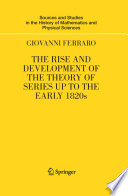 | Robert Goldblatt - Mathematics - 1998 - 326 pages
...ratios of quantities, which in any finite time converge continually to equality, and before the end of time approach nearer to each other than by any given difference, become ultimately equal . . . Those ultimate ratios with which quantities vanish are not truly the ratios of ultimate quantities,... | |
 | R. P. Burn - Mathematics - 2000 - 384 pages
...also by Newton who wrote 'Quantities, and the ratio of quantities, which in any finite time converge continually to equality, and before the end of that time approach nearer to each other than by any aiven difference, become ultimately equal.' (Principia, Book 1, Lemma 1, 1687). During the eighteenth... | |
 | Georg Wilhelm Friedrich Hegel - Philosophy of nature - 2002 - 400 pages
...op. cit. bk. I lemma i, 'Quantities, and the ratios of quantities, which, in any finite tune converge continually to equality, and before the end of that...difFerence, become ultimately equal. If you deny it, suppose them to be ultimately unequal, and let D be their ultimate difference. Therefore they cannot... | |
 | E.I. Gordon, A.G. Kusraev, Semën Samsonovich Kutateladze - Mathematics - 2002 - 442 pages
..."Quantities, and the ratios of quantities, which in any finite time converge continuously 4 ( >hupter 1 to equality, and before the end of that time approach...by any given difference, become ultimately equal" [408, p. 101]. Propounding the ideas which are nowadays attributed to the theory of limits, Newton... | |
 | I. Grattan-Guinness - Mathematics - 2003 - 872 pages
...I, Section 1, Lemma 1) stated: 'Quantities and the ratios of quantities; which in any time converge continually to equality, and before the end of that...by any given difference, become ultimately equal.' In his first published work on the calculus, the De quadratura published as 1704 as an appendix to... | |
 | Laurence Richardson - Philosophy - 2007 - 232 pages
...matematica, book 1 , lemma I: 'Quantities, and the ratios of quantities, which in any finite time converge continually to equality, and before the end of that...by any given difference, become ultimately equal.' Quotation is taken from Sir Isaac Newton 's Mathematical Principles of Natural Philosophy and his System... | |
 | John Lane Bell - Mathematics - 2005 - 354 pages
...Lemma reads: Chapter 2 Quantities, and the ratios of quantities, which in any finite time converge continually to equality, and before the end of that...other than by any given difference, become ultimately equal;1 its third: ...the ultimate ratio of the arc, chord, and tangent, any one to any other, is the... | |
 | Giovanni Ferraro - Mathematics - 2007 - 392 pages
...of Principia: Lemma 1. Quantities, and the ratios of quantities, which in any finite time converge continually to equality, and before the end of that time approach nearer the one to the other than by any given difference, become ultimately equal. (Newton [PN, 73]) This... | |
 | University of St. Andrews - 1901 - 712 pages
...Quantities, and the ratios of quantities, which, in any finite time, tend constantly to equality, and which, before the end of that time, approach nearer to each other than by any assigned difference, become ultimately equal. aShow that the limit of (cos 6) *", when 6 is infinitely... | |
 | Mathematicians - 1915 - 390 pages
...the following passage : "Quantities, and the ratios of quantities, which in any finite time converge continually to equality, and before the end of that time approach nearer the one to the other than by any given difference, become ultimately equal."2 Other passages in the... | |
| |